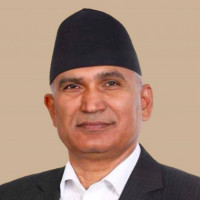- Sunday, 1 June 2025
Vamoosing Youths
Nowadays, it is common to hear about friends, siblings, or children going abroad, especially in Nepal. Many people discuss leaving the country for work or education, to the point where it is almost expected that someone in every family has ventured abroad. The term "Bidesh," or foreign land, has become ubiquitous in conversations among Nepalis of all ages. It makes me curious about how and why this trend has become so widespread in our society. Recently, I came across an article that mentioned a few 12th-grade students writing farewell notes, mentioning 'let's meet in Khadi,' which is a term used for Middle Eastern countries. There was also a video that went viral of the students who were interviewed about their plans after their 12 exams. Most of the students in Nepal are highly influenced by getting their higher education abroad. UNESCO figures show that the number of students from Nepal travelling abroad to study has more than doubled, from 44,255 in 2017 to 95,268 in 2022. Even Nepal’s outbound mobility ratio—the number of students from a given country studying abroad, expressed as a percentage of total tertiary enrolment—is a massive 21.6 per cent. This is 10 times more than the ratio for China (2.2 per cent) and 15 times more than the ratio for India (1.4 per cent).
What could be the reason for this increasing number of students going abroad to study? Is it that Nepal does not have enough universities and colleges for higher education? Well, it is not quite that because, for instance, there are twelve universities in Nepal, and there are more than 1000 colleges affiliated with one of these universities that are growing like mushrooms. Then what is the reason for this huge increase in students heading abroad for higher studies? Well, there are various reasons and various factors. The first is the poor quality and infrastructure of the educational institution. And the second, and most prominent, is better employment facilities. Students in Nepal are facing challenges due to a tough economy and high inflation. Finding well-paying jobs locally is difficult, and graduates are uncertain about landing their desired positions. Many Nepali students believe that international universities better prepare them for the workforce. Studying abroad not only offers educational opportunities but also allows them to work part-time, covering their living expenses and enabling them to send money back home. Despite earning a modest income abroad, the converted rupees make it seem more substantial than what they could earn locally. This mindset has become widespread, causing a rapid increase in Nepali students going abroad. As a result, local universities are struggling to fill their seats, reflecting a decline in student enrollment.
I also came across an article that mentioned how Nepal could become a hub for higher education, just like Thailand and India, by building policies and infrastructure to attract foreign students. Kathmandu University has even requested Nepali missions abroad, the embassies of different countries in Nepal, and education consultancies to make efforts to attract foreign students. Making Nepal a hub for higher education is an interesting and convincing approach, as this would fill the vacant seats of universities and help Nepali higher education institutions earn recognition and creditability. But what is the gain for Nepali students? The major problem for Nepali students is finding a better-paying job after graduation and long-term financial security in Nepal. Therefore, Nepal should look for a long-term solution to improving the economy that could provide security and influence students to stay. In my view, making Nepal a hub for higher education would benefit institutions by gaining recognition and credibility. However, it might not necessarily be advantageous for Nepali students, as this approach could be seen as addressing a different issue rather than solving the challenges they currently face. The focus should also remain on providing opportunities and support for local students within the country.
(MBA, Kusum College, Balkumari, Kathmandu.)
















